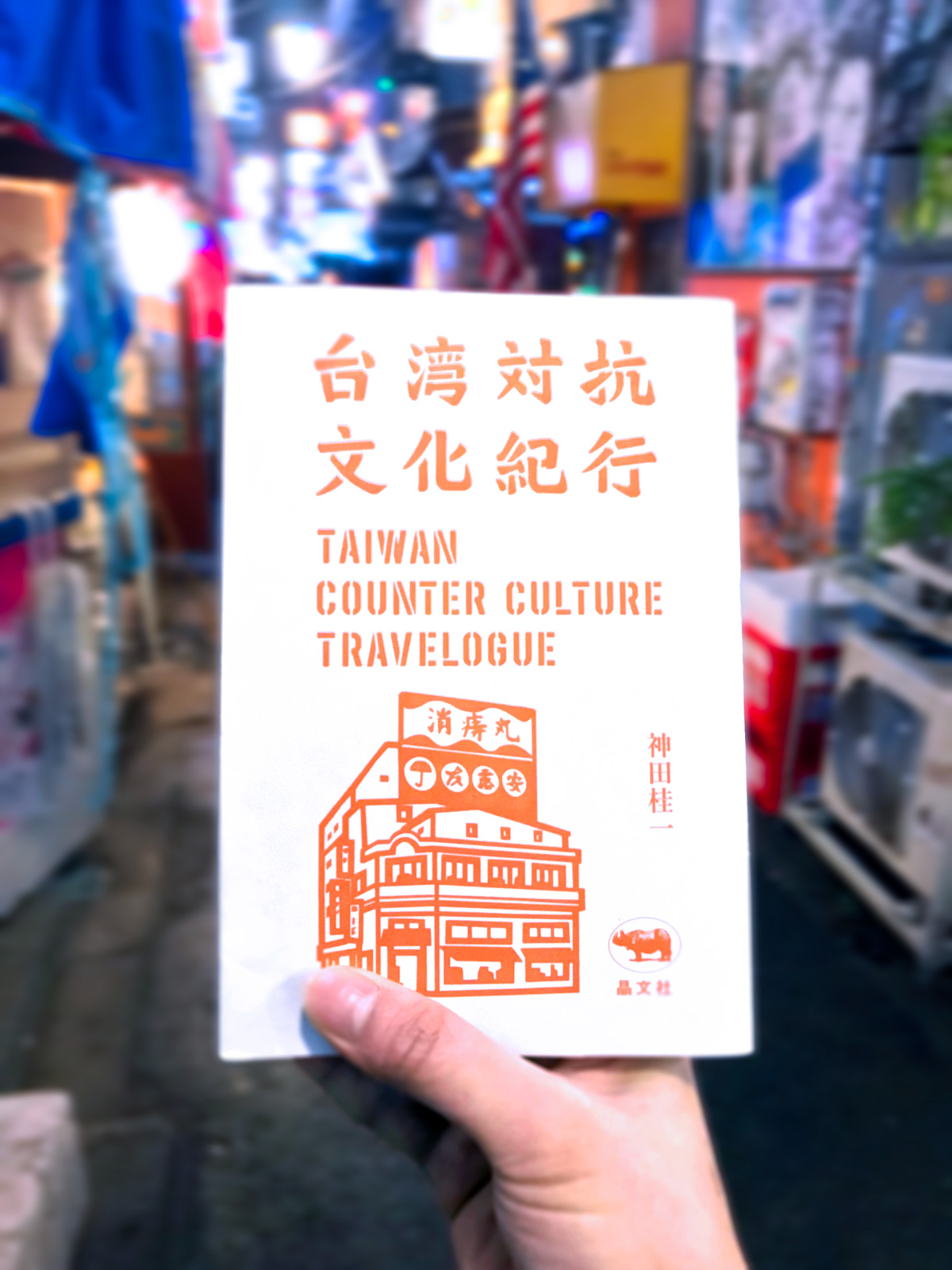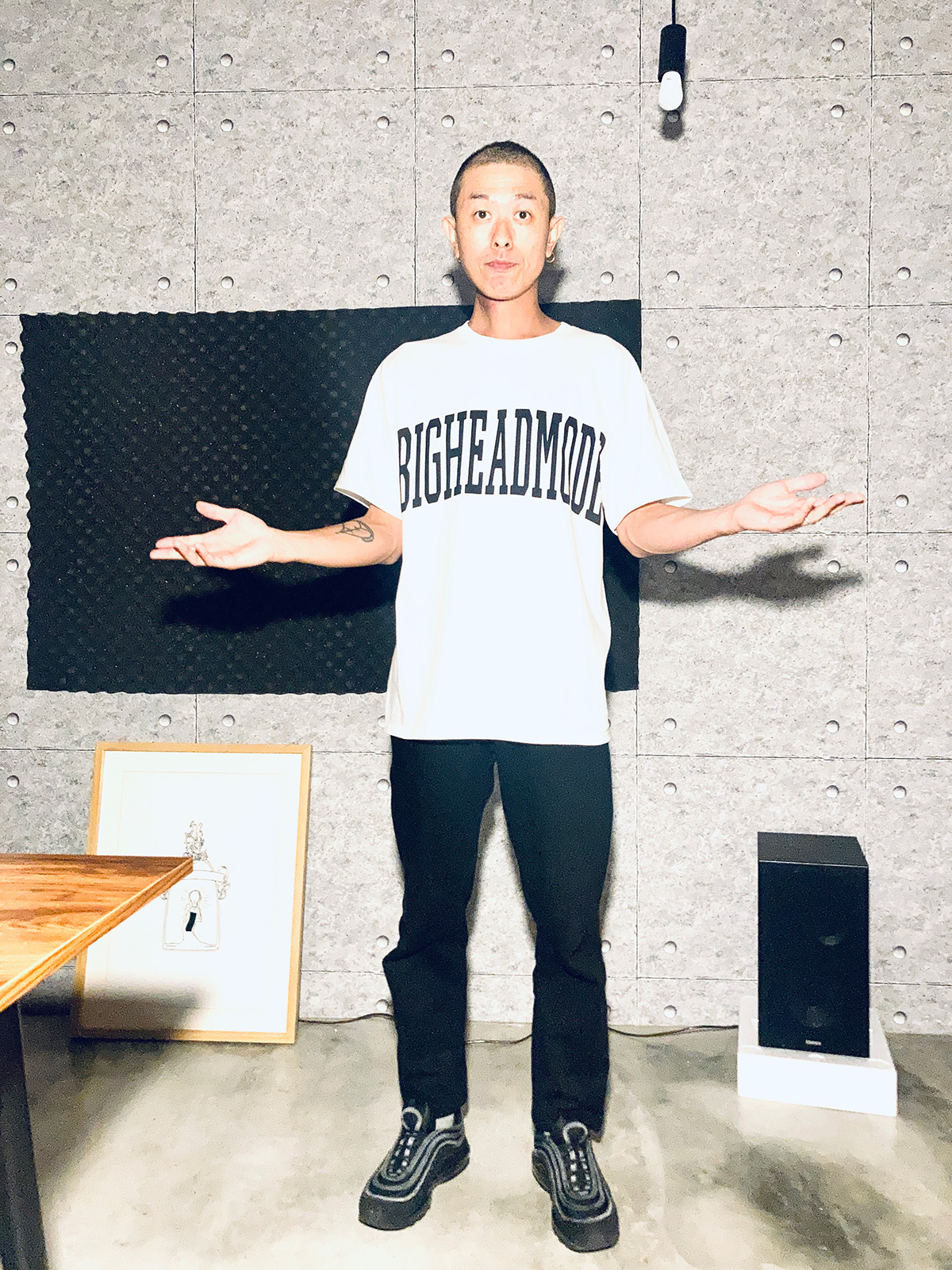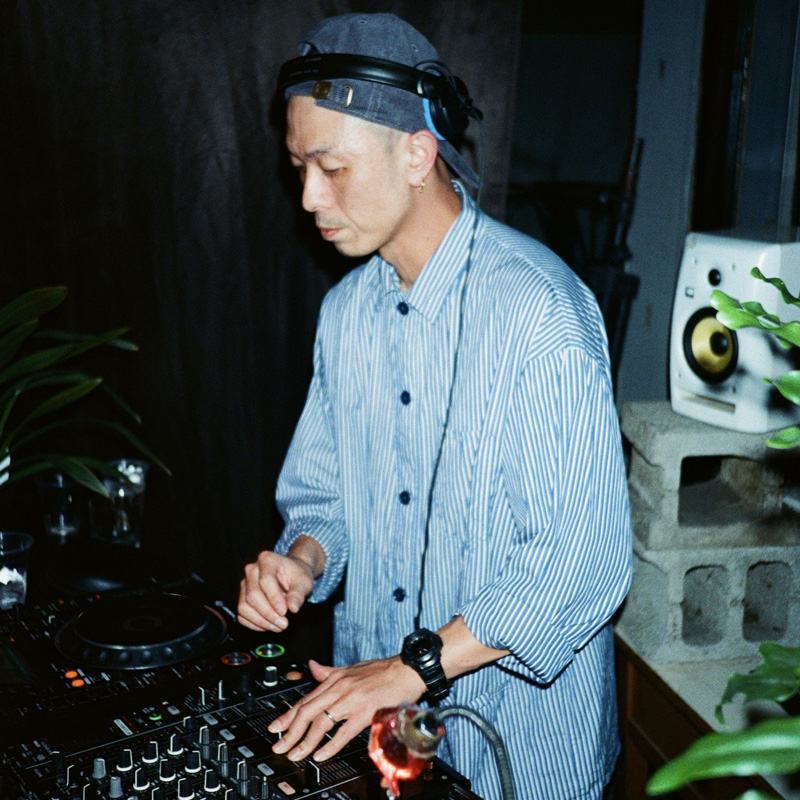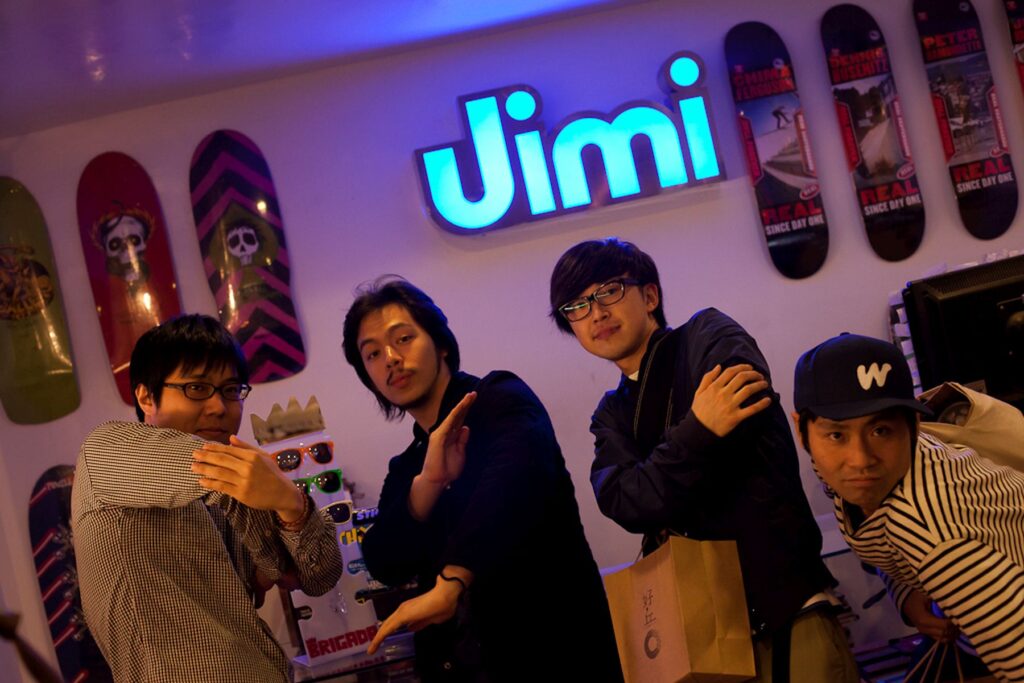DJ and event organizer Spykee, who served as the director of the popular Taipei venue The Wall, currently lives in Taipei. In 2022, he started as director of Romantic Office, which manages the venue Taipei Moon Romantic. With an illustrious DJing career of over twenty years, he has also been responsible for bringing countless Japanese bands and artists as an event organizer. Bands that he has brought to play in Taiwan include Cero, Your Song Is Good, KID FRESINO, VIDEOTAPEMUSIC, Yogee New Waves, and Never Young Beach. The recent musical interactions between Taiwan and Japan is in part due to him.
In his book Taiwan Counter Culture Exchange Travelogue published last November by Shobunsha, author Keiichi Kanda writes about the excitement and possibility of Taiwan’s alternative culture and independent scenes through his many visits to Taiwan. Kanda and Spykee reunite over Zoom after two years (a recording of Kanda’s interview with Spykee is also available in this publication).
I interviewed them about how the relationship between Taiwan and Japan’s music scenes was affected by their encounter and about what is currently happening in Taiwan.
How and when they discovered music from the other person’s country
— When did you both meet?
Keiichi Kanda: In 2018, I directed a trilogy film about Taiwan’s music scene that was on a video media platform called Lute.
In the first part of the trilogy we interviewed the band Forests, who was playing at The Wall, a venue in Taipei. My interpreter Buddha Terao introduced me to Spykee, who was DJing at the venue, and we talked for a bit. That’s how we first met. Buddha Terao is a very important figure, because he’s the connection between the venue Moon Romantic that has both an Aoyama and a Taipei location.
— Mr. Spykee, you started in the music industry as a DJ, but have worked a wide variety of jobs, like venue director and event organizer. Can you talk a little about when you first started out as a DJ?
Spykee: I used to frequent this DJ bar called SPIN every weekend when I was in college. I slowly started wanting to DJ myself, so I got together a DJ setup and started buying records at a Taipei record shop whose owner was a DJ at SPIN. Through that, I was able to start DJing at SPIN myself. A year later, I became a resident DJ.
— Has your DJ style changed since then?
Spykee: I’ve been the resident DJ at club events since the early 2000s. At first, I played a lot of drum and bass, and later focused more on electroclash. I’ve always liked band music, and wanted to incorporate it into my set, but that was hard given that I was playing at clubs. A turning point was when I became the resident DJ at an underground venue called The Under World. There, I played each set with music from different genres and eras.
Kanda: I remember you were playing a lot of different styles when I first met you at The Wall, including band music. I don’t remember much, though, because I was having a little too much fun (laughs).
— Mr. Spykee, when and how did you encounter Japanese music?
Spykee: I opened a record store in 2014. Back then, I just wanted to know about different genres and encounter music I didn’t know about. Of all the music I listened to, what I got hooked on most was Japanese indie music. At my store, I personally selected Japanese records I liked and sold them. That’s when I met Mr. Buddha Terao, who Mr. Kanda just mentioned.
— Which Japanese band did you first get into?
Skykee: Yogee New Waves. I first found them on the JETSET website. I was immediately enamored when I heard their music. Omoide Yaro A Team also had a profound impact on me. Their music made me rethink how I valued my music. There were no bands in Taipei that made music like they did. That triggered my interest in other bands from the same era. I even went back to listen to older bands that they were influenced by and deepened my understanding of Japanese music.
— Mr. Kanda, how did you, on the other hand, encounter/get into Taiwanese music?
Kanda: My first encounter was at a record store I visited when I first went to Taiwan in 2011. I never choose a place to stay when I travel, and I didn’t on this trip, either. I initially ended up staying at this awful place near the train called Nakayama (laughs). It was essentially a lodge for Japanese people because the staff understood Japanese. But the people staying there were mostly young partiers, and I did not belong. On top of that, I had to leave the place after a day because there was a fire close by, and the smoke kept coming in through the window (laughs). When I was looking for another place to stay, I found a guest house close to the National Taiwan Normal University, which is in a neighborhood that happened to have a bunch of venues and record stores. That area is considered “music city”, right?
Spykee: Yeah, it’s that kind of area.
Kanda: I was strolling around and found a record store. I walked in, and there was a person who spoke Japanese who explained Taiwanese music to me. I bought a couple records, and when I listened to them when I got back, they were so good. That’s how I got hooked on Taiwanese music.
— What bands’ music did you buy then?
Kanda: I bought a Touming Magazine record. They were really popular at the time (editor’s note: inspired by Number Girl, Sonic Youth, Pixies, Touming Magazine is a Taiwanese alternative rock band). I also bought a Wayne’s So Sad record (editor’s note: Taiwanese punk band formed in 2008), and another one I don’t remember.
Spykee: If it’s something similar to those, it was probably a Hang In the Air record?
Kanda: Yes, that!
Spykee: Hang In the Air is a band similar to Japan’s Fishmans. They’re a rock band that incorporates dub and reggae elements. I recommended those three bands a lot if someone was into Japanese indie music.
Kanda: I didn’t know Taiwanese music at all until then, so it was so fresh. Since then, every time I visit Taiwan, that neighborhood is where I spend the most time. Also, the main branch of Din Tai Fung is around there, so it’s a great place to be if you want to eat a lot of soup dumplings (laughs).
Young Taiwanese artists are full of DIY spirit
— I’d like to know about the current Taiwanese music scene. What are some similarities between young artists?
Spykee: They definitely have a DIY spirit. I think there are many artists now who don’t feel the need to be signed to a major label. There are government subsidies available if someone wants to release an EP or album, but they basically fund things themselves.
Kanda: Doesn’t Sunset Rollercoaster run their own company?
Spykee: Trix, the drummer for Touming Magazine — the band Mr. Kanda mentioned earlier — also has his own label.
— Where does that DIY spirit come from?
Spykee: I think watching older generations of artists who were signed to major labels change their music style to fit the market was a huge factor. Not that that’s a bad thing; there are plenty of artists trying to get signed to a major label. But I also think there are an increasing number of artists who want to make it with their own music and don’t see signing to a major label as a goal.
— Speaking of markets, do you think there are more artists now who think of marketing their music globally?
Spykee: Sunset Rollercoaster is a great example of a band that I think wanted to make it internationally from the get-go. Their lyrics are in English. Many people around the world have access to music from different countries through subscription services, so I have been seeing a trend in artists also trying to market outside of Taiwan.
Kanda: I think Taiwanese artists are more conscious of delivering their music to the world than Japanese artists are. Perhaps it’s because Japanese musicians can thrive within the Japanese market and not have to rely on outside markets to make a living. But I think Japanese artists may start to be influenced by Taiwanese artists in that regard.
How the intermingling of Taiwanese and Japanese artists started
— In terms of the relationship between Japanese and Taiwanese artists, how do you, Mr. Kanda, feel about what has transpired in the last decade?
Kanda: When I first went to Taiwan around 2011, there was basically no musical interaction between Japan and Taiwan. Even if someone was “an influence” on another, it usually was one-sided. But they slowly started to intermingle as Japanese bands and musicians started playing shows in Taiwan and with Taiwanese artists. I think that’s what Spykee and his crew intended.
— What about you, Mr. Spykee? How did you come to bring Japanese bands to Taiwan and plan events like this?
Spykee: I mentioned earlier that I got really into Yogee New Waves’ music, and I desperately wanted them to play a show in Taiwan. I talked to Buddha Terao about it, and we were able to bring Yogee New Waves along with their label mate Never Young Beach here in September of 2015. That’s how I started planning events and organizing Japanese bands to come to Taiwan.
— Is there anything you keep in mind when planning a show or event for a Japanese band?
Spykee: When I first started bringing Japanese bands to Taiwan, I usually had them play with Taiwanese bands in similar genres or styles. In Taiwan, the organizer may come under fire if the musicality between the main act and opening act differ, while it’s rather common in Japan to have bands and artists of different genres play together. I wanted to try something like that in Taiwan, so I’ve been challenging myself to do more of that these past three or four years. For example, when I had Omoide Yaro A Team here, I got Taiwanese rapper LEO37 to play with them. When I brought KID FRESINO here, I had R&B neo soul singer-songwriter LINION play with them.
Kanda: Just when I thought Spykee and his crew were getting things rolling and new things were starting to develop, Covid happened. Now the interactions are stagnant, which is unfortunate.
How both Taiwanese and Japanese scenes will look in the future
— That’s so true. Covid is ongoing, but I would love to know if there’s anything interesting happening in the Taiwanese scene.
Spykee: There are definitely more smaller events happening, probably because of Covid. There aren’t as many small DJ bars or bars meant for smaller shows in Taipei as there are in Tokyo, but they’re increasing. Now, I feel like there’s more emphasis on enjoying everyday shows instead of on special weekend events.
Kanda: Interesting. By the way, are there talk live-houses in Taiwan? Like Loft/Plus One, where musicians can hold events where they just talk?
Spykee: Hmm, I’m not sure… I don’t think there are.
Kanda: Really? There are a bunch of places like that in Tokyo. Maybe I’ll start a talk live-house in Taipei (laughs).
— This may be a business opportunity! By the way, what Taiwanese trends have you recently been tuned into?
Kanda: There was news that Freddy Lim (Taipei-born legislator and vocalist in heavy metal band Chthonic) survived a recall election. I thought that was wonderful news.
— Interesting. In terms of politics, there’s a relatively high percentage of young voters, isn’t there?
Spykee: People don’t usually passionately discuss who they’re voting for, but they do vote. In the October 2021 Japanese House of Representatives Election, artists and cultural figures shared their stances on social media, pushing for people to go vote. Did that movement trigger any changes?
Kanda: That’s true, there was some movement on social media, but it’s kind of an echo chamber… We might see these changes on our own timelines, but there are still plenty of people online who have no interest in things Iike that. For a second, I thought maybe the opposition could take over, but in actuality… Although I do think people are starting to talk more about politics than before.
— Lastly, I want to know what you both think about the future of Taiwan and Japan.
Spykee: Many teenagers come to see Japanese bands perform when they’re in Taiwan. These teens can speak English, too. I see a future with more opportunities for us to be able to interact with Japan in music and in other areas.
Kanda: I agree. I think we have a lot to learn from Taiwan, like with anti-nuclear protests and LGBT rights. I think we can have a positive influence on each other in cultural and social realms. I also haven’t been able to go to Taiwan since Covid, so I want to go back as soon as I can. I’d also love to have an event to celebrate the publication of my recent book, Taiwan Counter Culture Travelogue in Taiwan!
Keiichi Kanda
Born in Osaka in 1978. Author/manga writer/general moderator. Works published in Popeye, Kettle magazine, The Spectator, Shukan Gendai, Ronza, and others. His book co-written by Ryo Kikuchi, Moshi Bungou Tachi Ga Cup Yakisoba No Tsukurikata Wo Kaitara was published by Takarajimasha. In November of 2021, his book Taiwan Counter Culture Travelogue was published by Shoubunsha.
instagram:@pokke0902
Twitter:@pokke0902
Spykee
Director of Romantic Office, and has been DJing for 20 years. Was responsible for getting Cero, Your Song Is Good, STUTS, KID FRESINO, VIDEOTAPEMUSIC, Skirt, Yogee New Waves, Never Young Beach, Homecomings, Omoide Yaro A Team and other bands to perform in Taiwan.
Translation Mimiko Goldstein





